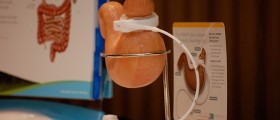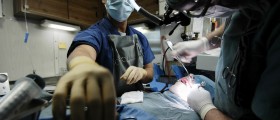
Bariatric surgery is performed on the people who are overweight in order to reduce the weight and complications that follow this condition. It is a common surgery in America which has a positive long term outcome. The size of stomach is reduced and a special device is implanted in the patient's stomach which regulates the amount of food that can be digested. The bariatric surgery can have positive affect on diabetes and cardiovascular condition, but the patient must have healthy lifestyle in order to avoid complications.
Some of the complications can appear shortly after the surgery is performed. Since the weight makes additional pressure on the chest and lungs, after the surgery the patient may be at risk of getting pneumonia. Also, there is a danger of having a blood clot in the leg. In order to prevent it, the patient must do exercises such as walking and moving the legs while lying down. In rare cases the patient may get an infection after the bariatric surgery. Another rare complication is a leakage in the stomach but this can be treated with antibiotics.
Long term complications can appear as well. In some cases the patient may develop an ulcer which is located at the place where the small intestine is connected to the stomach. Some patients can develop a hernia which must be surgically treated in most cases. Another surgery is usually required if the opening between the small intestine and the stomach is too narrow. This complication may be also fixed with a tube which widens the opening. The tube is inserted through the mouth all the way to the opening.
Other complications after bariatric surgery can be low sugar level which may later cause some neurological symptoms such as confusion and insecurity, problems with vision and in rare cases seizure. If the patient has some of these symptoms, he/she should not drive a car or do any work which can put him/her in danger.
After the bariatric surgery the patient's body may have some problem with the absorption of some minerals and vitamins. The patient can develop complications such as anemia or neurological problems which can be a consequence if there is not enough vitamin B12 or iron in the body. If there is lack of vitamin D, the patient can have bone diseases. In some cases, if the absorption of calcium is disturbed, it can cause kidney stone. The patient can also have diarrhea after the surgery and may experience dehydration because he/she will not be able to drink a large amount of liquid at once.
It is important for the patient to visit the doctor regularly after the bariatric surgery. The doctor will recommend the diet and the necessary changes in lifestyle. Some of the symptoms that can be related to the recovery from the surgery are frequent mood changes, losing hair, dry skin, chills and fatigue.
















Your thoughts on this
Loading...